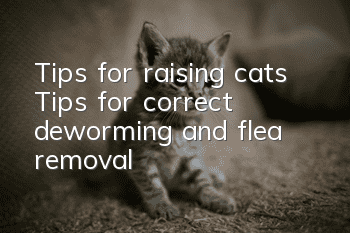Tips for raising cats: Tips for correct deworming and flea removal

Parasites are a headache for pet owners because they not only make their pets uncomfortable, but they can also be transmitted to other pets, and some are even transmitted to humans. If your pet exhibits scratching behavior or diarrhea, it is likely to be caused by parasites.
1. How cats are infected with parasites
1. Parasites in cats
Internal parasites include roundworms, tapeworms, coccidia, hookworms, trichomonas, giardia, burnworms and heartworms. External parasites include Demodex, scabies, ear itch mites, fleas and lice.
2. Oral infection of insect diseases
Cats swallowing infectious eggs or larvae when eating or drinking, or eating transmission hosts with larvae, such as cockroaches and other insects, are the main causes of oral infection.
3. Infection from mother to fetus
There are parasites in the mother, and the larvae infect the fetus through the placenta, such as roundworms and hookworms. It is also possible to transmit infections such as Toxoplasma to lactating kittens through milk.
4. Infection through skin
Infectious larvae directly penetrate the cat's skin, burrow into the cat's body, and metamorphose to the parasitic site to parasitize, such as hookworm larvae. Transmission occurs through an intermediate host, such as mosquitoes that can transmit heartworm larvae.
5. Animal contact infection
When a healthy cat comes into direct contact with a sick cat, parasites, such as mites, lice, fleas, etc., will be transmitted from the sick cat to the healthy cat. If a sick cat needs to be separated from other pets, it should be treated before getting along with it.
6. Indirect contact infection
Because parasites can live in the external environment for a period of time, for example, mites on a sick cat can survive in the daily necessities used by the cat for more than ten days. If these items are not disinfected and used directly by healthy cats, parasites will be transferred to healthy cats.
If an owner touches a sick cat's hands and touches a healthy cat without disinfecting them, he may also spread parasites.
2. Pay attention when deworming cats
1. Timing of deworming cats
Kittens can be dewormed for the first time 20 days after birth, mainly to prevent parasites infected during the fetal period. Kittens should be dewormed once every 2 to 4 weeks before they are six months old; after that, they should be dewormed once a quarter.
Female cats used for breeding need to be dewormed once before breeding and again one week before giving birth.
2. Types of anthelmintics
Anthelmintic drugs for cats are generally divided into internal anthelmintic drugs and external anthelmintic drugs. Commonly used internal anthelmintic drugs for cats are Miauba, Bayer, Da Chong Ai, etc. The most common external anthelmintic drug for cats is Fulin.
3. Dosage of cat anthelmintic medicine
Anthelmintics are toxic, so be sure to follow the instructions on the instructionsPlease feed the cat, especially domestic anthelmintic drugs. Be sure to weigh the cat before using the drug, and calculate the dosage based on the weight.
4. Preparation before and after deworming
Cats should be bathed before external deworming. After they are completely dry, apply the deworming medicine on the back of the cat's neck where it cannot be licked. Do not bathe the cat again until the deworming medicine has expired.
Internal deworming should be carried out 3 to 4 hours after the cat has eaten food, and fasting for 5 or 6 hours after feeding the deworming medicine.
5. Observe the feces after expelling
A few days after deworming, dead parasites and eggs will usually be excreted with the stool. If symptoms of diarrhea occur, it is best to consult a doctor.
6. Deworming mental state
Under normal circumstances, some cats will develop symptoms after deworming, such as vomiting, lack of energy, fever and other symptoms. Pet owners don’t need to worry when this kind of symptom occurs, it will usually get better within two days. If it doesn't feel better after a few days, you should take it to a doctor.
- Is Turkish Angora cat easy to raise?
- What should I do if my British shorthair cat is infected with cat ringworm?
- Will the first cat be jealous if I get a second cat?
- How many grams of cat food should a cat eat per day?
- The kitten's breathing rumbled
- How to make a cat obediently cooperate with training? Cat training!
- Garfield cat breeding patterns and colors
- Why do cats love to lick their owners? Do they think they are too dirty?
- How to raise Garfield cats?
- What should I do if there are lumps of eye droppings in the corners of Persian cat’s eyes? How to deal with it?



